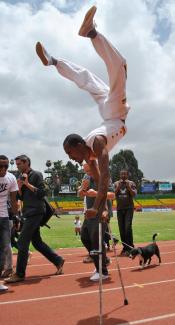Education
Good intentions are not enough

On paper, Ethiopia’s Education Sector Development Programme (ESDP) IV looks good. It states that the goal of vocational education and training programmes is "to create competent and self-reliant citizens" as well as to transfer "technologies to contribute to the economic and social development of the country". Ultimately, the objectives are "poverty reduction and sustainable development".
In theory, persons with disabilities should be included in educational programmes, but this is not happening. In 2012, the government confirmed in its Revised Special Needs Education Programme Strategy that the participation of students with disabilities in vocational training programmes is insignificant. As a result, persons with disabilities normally belong to the poorest of the poor in Ethiopia.
This state of affairs is not unusual. In 2011, the World Health Organisation (WHO) and the World Bank published a Joint Global Report. It revealed that more than 1 billion people worldwide live with various types of impairments. Eighty percent of them were said to live in low-income countries. The majority of them tend to be poor and do not have access to basic services, including opportunities to education and technical and vocational education and training.
While serious challenges haunt vocational training in Ethiopia, there are legal provisions and policies – at least on paper – for the participation of students with disabilities in both regular general education and vocational training programmes. For instance, there is a "Vocational Education Strategy", a "Special Needs Education Programme Strategy" and there are supposed to be teachers for special-needs education. Some regions such as Tigray and Amhara have even introduced affirmative actions to enhance the participation of students with disabilities in vocational education programmes.
Challenges remain
Despite all the programmes and laws, the situation amongst disabled students in Ethiopia does not look good. More support seems to be promised than actually granted in real life. Students with disabilities are mostly excluded from all kinds of educational opportunities. Institutional barriers as well as prejudices obstruct their inclusion in training programmes.
In the course of preparing my PhD thesis, I have done an assessment, using qualitative research methods. The goal was to determine the status of inclusion of persons with disabilities in Ethiopia in regard to the relevant international human-rights agreements. The conclusion was that the special needs of disabled students are not being properly addressed. There are even issues that prohibit and restrict the participation of these students in regular schooling and vocational training.
The main factors that hinder the involvement of students with disabilities in vocational education are:
- Teachers’ limited awareness of special-needs education.
- Ineffective and inconclusive cooperation between government bodies such as the Special Support and Inclusive Education Directorate and the Technical and Vocational Education and Training Agency (TVET), which both belong to the Federal Ministry of Education.
- The TVET colleges are not adequately equipped with adaptive training/instructional materials.
- There is no opportunity for TVET college instructors to be trained in special-needs education.
- No special support system for students with disabilities is in place in TVET colleges.
- The physical and social environments of TVET colleges are not friendly to students with disabilities due to negative attitudes, poor communication and institutional barriers.
- In the annual action plans and reporting formats of the various TVET institutions (colleges, regional bureaus and agencies), the issue of special-needs education is not yet mainstreamed.
- There are no budget earmarks for the implementation of special-needs education at all levels of the sector.
- Physical and mental fitness is required as entry criteria for the enrolment of students in formal vocational education programmes as stated in the model curriculum prepared by the ministry based on the occupational standard developed in 2007.
As a result, access to formal vocational education remains extremely limited for students with special needs. The long list of practical issues shows that the provisions laid down by law are not being translated into reality. There is another huge hurdle. Students who are interested in joining the vocational education programme are required to score the passing grade of the national exam given at grade 10 level. Since most children with disabilities do not get the access to the regular education system, they cannot meet this entry requirement to vocational education. This is, in fact, structural discrimination. In the school year 2011/2012, according to the Federal Ministry of Education, only 3.2 % of school-age children with disabilities got access to education at all. All summed up, they must be extremely lucky to get adequate support from non-governmental organisations (see box).
Far too few Ethiopians with disabilities get an opportunity to develop skills and different abilities. Tameru Zegeye is a rare exception. He was born with two deformed feet and has become an athlete, running on his arms and crutches. His case is inspiring and highlights that everybody deserves a chance in life. Obviously, a lot remains to be done to make good governmental intentions come true in regard to social inclusion of all persons with disabilities.
Abebe Yehualawork is a visually impaired person from Ethiopia who is working on his PhD thesis at Jyvaskyla University in Finland.
abework2011@yahoo.com














